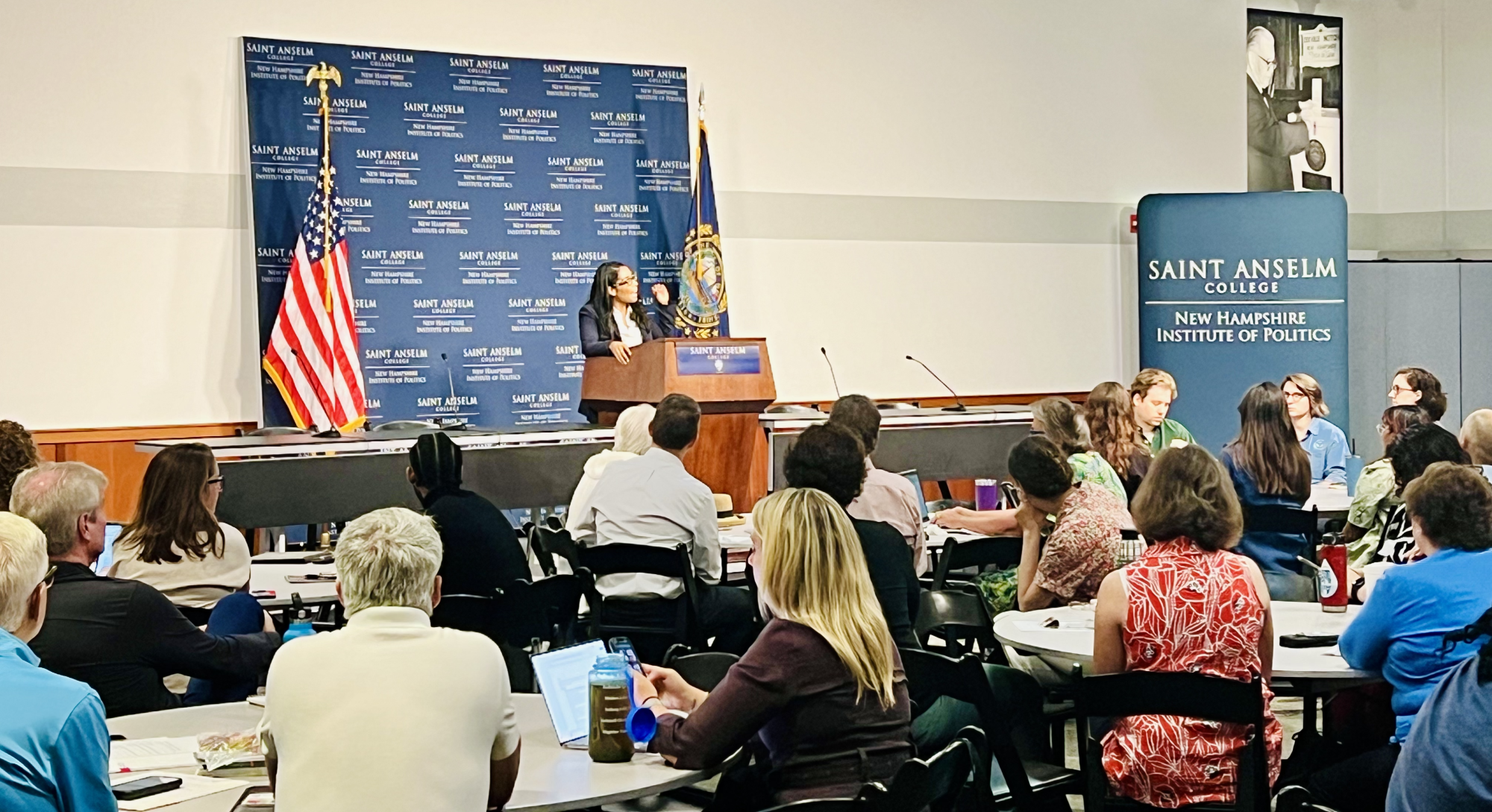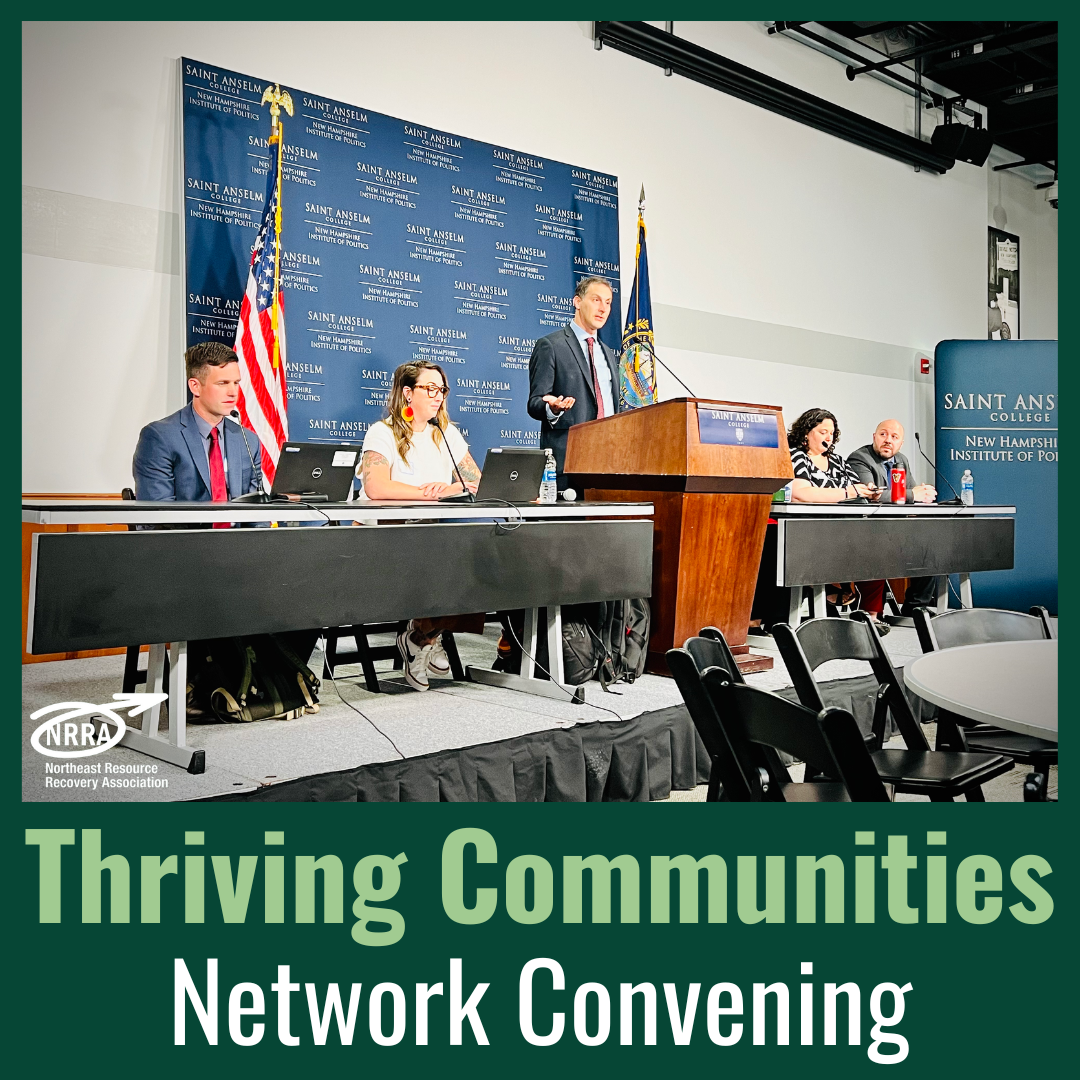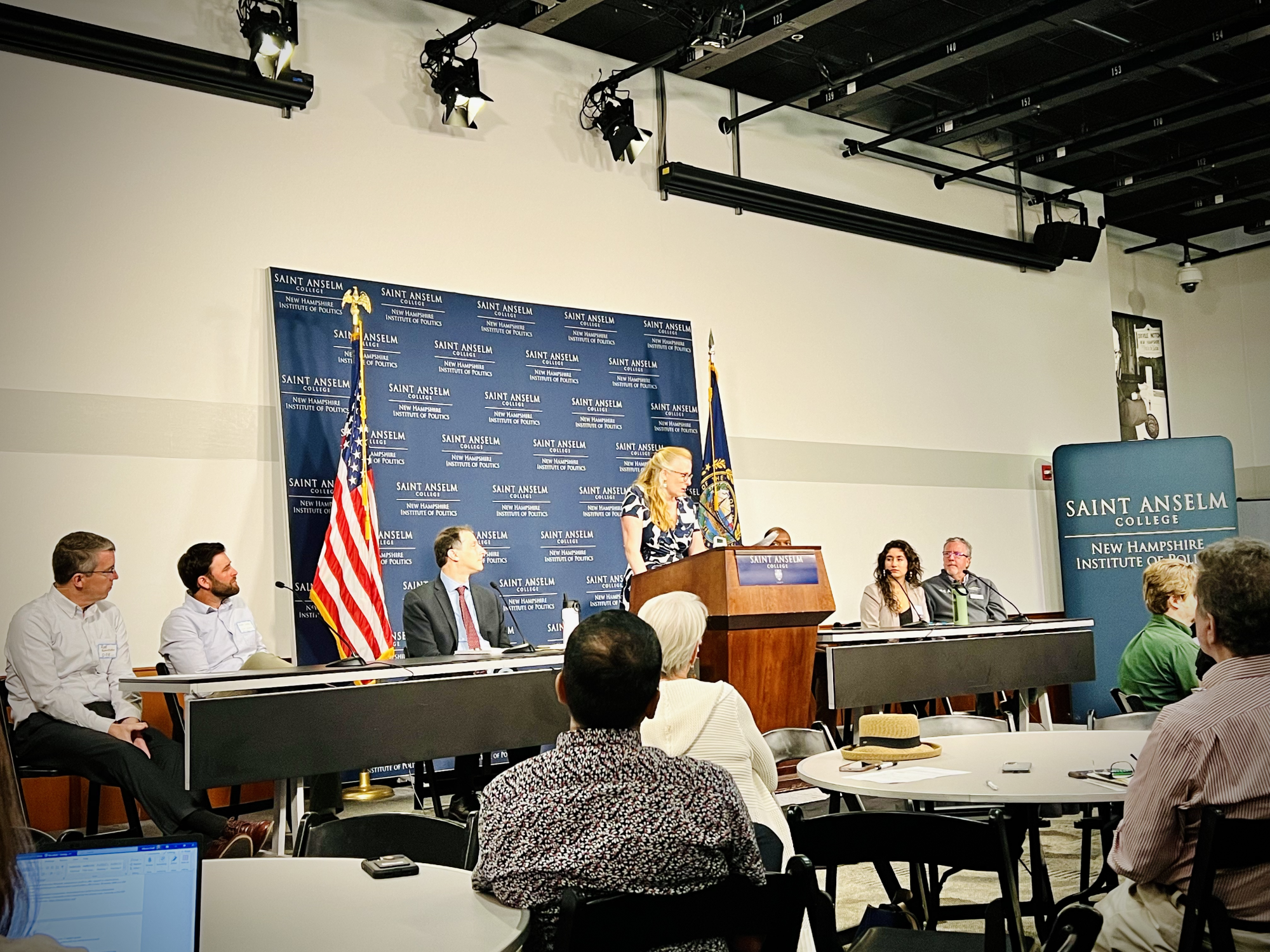Northern New England Thriving Communities Convening
More than 125 people from across Maine, New Hampshire, and Vermont joined Thriving Communities Technical Assistance (TA) Providers and federal agencies as part of the Federal Interagency Thriving Communities Network convening at St. Anselm College Institute of Politics earlier this week.
NRRA Communications Manager, Andrea Folsom, attended the event on behalf of NRRA to gather additional resources for and share the challenges faced by NRRA's Municipal Members - including the need for more solid waste infrastructure funding for all NH municipalities and cumbersome grant application and reporting requirements - with the federal agencies in the room.
Applying for and managing federal grants can seem particularly daunting for smaller municipalities that may lack the personnel to write or manage grants. More often than not, municipal staff are required to wear many hats to help their community function smoothly. The Thriving Communities Network aims to reduce barriers to federal grant funding by providing resources and tools municipalities of any size can use to successfully compete for federal funding.
Specifically, the Network brings together federal agencies to coordinate place-based technical assistance (TA) and capacity-building resources for urban, rural, and Tribal communities experiencing a history of economic distress and systemic disinvestment. These federal resources include grant and financial management support, pre-development assistance, community engagement, planning, and project delivery support.

The day-long event featured presentations on federal funding and technical assistance programs available to communities facing environmental and economic challenges, as well as time for federal staff, TA providers, and community-based organizations to discuss their priority projects, develop partnerships, learn from each other, and identify potential support.
Participating agencies and technical assistance programs include the following (click on the agency name to learn more about what their program offers): U.S. Department of Agriculture (USDA), U.S. Department of Transportation (DOT), U.S. Department of Energy (DOE), U.S. Department of Housing and Urban Development (HUD), Economic Development Agency (EDA), Environmental Protection Agency (EPA), U.S. General Services Administration (GSA), Federal Emergency Management Agency (FEMA), Department of Health and Human Services, National Endowment for the Arts (NEA), and Department of the Treasury.
Thriving Communities Principles
Thriving Communities Network partner agencies commit to collectively supporting the following shared principles:
- Scale for Impact – Proactively identify and collaboratively support transformative projects that demonstrate the potential for equitable, inclusive community and economic development in underserved communities.
- Build Community Wealth – Build long-term community capacity to successfully compete for, leverage, and manage the investment of Federal funds in strategic projects and activities that build lasting community wealth.
- Center the Power of Community – Provide technical assistance that values, leverages, and grows the local expertise existing within communities regarding their needs with inclusive and culturally competent public engagement processes.
- Meet Areas of Greatest Need – Prioritize support to rural, urban, suburban, and Tribal communities that have the greatest resource and capacity needs.
- Expand Access and Participation – Intentionally remove barriers and create access to economic, health care, education, energy, housing, and environmental opportunities in every part of the country.
- Diversify Knowledge – Diversify the pool of capacity-building providers to include a greater number of disadvantaged and small businesses, entrepreneurs, and those with community-based expertise.
Key Takeaways and Helpful Resources
1. Technical Assistance for all things grant related is your friend!
There are several organizations that can help you find, prioritize, and apply for grants. Even if you don't think your town fits the criteria needed for a grant, it's still a good idea to reach out. (Hint: most communities in New Hampshire are considered "rural" with a population less than 50,000 people!)
- Northern Border Regional Commission (NBRC) Technical Assistance: Fill out a short form with the type of projects you are trying to fund and be connected with a technical assistance provider who will help identify an NBRC grant or loan program that fits your needs. The technical assistance is completely free; NBRC currently serves the NH counties of Belknap, Carroll, Cheshire, Coos, Grafton, and Sullivan. Merrimack County is set to be added if/when the 2024 Farm Bill is passed through Congress.
- The Environmental Protection Network is made up of EPA alumni offering technical assistance to rural communities. This assistance includes weekly emails and funding opportunities, webinars, office hours to talk through a project, one-on-one support with community outreach associates and volunteers, and grant application reviews.
- Institute for Sustainable Communities (ISC) is one of three national Environmental Justice Thriving Communities Technical Assistance Centers (EJ TCTACs) and is serving as the Regional Technical Assistance Center for New Hampshire and Vermont. Their focus is on helping rural communities access equitable climate change solutions, including grant support, partnership identification, budgeting, capacity building, translation and more.
- The Rural Community Assistance Partnership (RCAP) is a national network of nonprofit partners with over 350 technical assistance providers across the country. Technical assistance includes helping communities by providing practical guidance and capacity-building expertise – from financial advice, to environmental services like helping communities comply with federal and state regulations, training, and capacity building.
2. If you can connect creativity to your project, there's a grant for that!
Think wildflower meadows at the recycling center or sculptures made of recycled art at the transfer station. The National Endowment for the Arts is willing to get creative with their grants to bring both function and beauty to your town. Our Town is the NEA’s creative placemaking grants program. Through project-based funding, the program supports activities that integrate arts, culture, and design into local efforts that strengthen communities over the long term.
3. DOT and HUD now have grant navigator programs that prioritize grants for rural and tribal communities!
- The DOT Discretionary Grants Dashboard provides communities with an overview of discretionary grant opportunities that can help meet their transportation infrastructure needs. Designed with all communities in mind, the Dashboard identifies grant programs with rural and Tribal set-asides or match waivers available. The Dashboard also includes Federal grant programs outside of DOT that may be of particular interest to rural communities. The Dashboard is updated weekly.
- The HUD Exchange Funding Navigator provides a listing of funding opportunities under the Inflation Reduction Act (IRA), Bipartisan Infrastructure Law (BIL), and others across federal agencies to support efforts to enhance climate resiliency, energy efficiency, renewable energy integration, healthy housing, workforce development and environmental justice in HUD supported communities, programs and properties. Find open and upcoming opportunities for funds to implement projects that reduce energy use and strengthen resiliency in communities.
4. Don't forget about FEMA!
If your town was affected by flooding or other natural disasters, be sure to look into FEMA's Building Resilient Infrastructure and Communities grant and Direct Technical Assistance (BRIC DTA), which provides tailored support to communities and tribal nations that may not have the resources to begin climate resilience planning and project solution design on their own. Through process-oriented, hand-in-hand assistance, BRIC DTA will partner with communities interested in enhancing their capability and capacity to design holistic, equitable hazard mitigation solutions that advance community-driven objectives.
FEMA will offer wide-ranging non-financial support to BRIC DTA communities, including climate risk assessments, community engagement, partnership building, and mitigation and climate adaptation planning. Support for BRIC DTA communities can range from pre-application activities to grant closeout.

